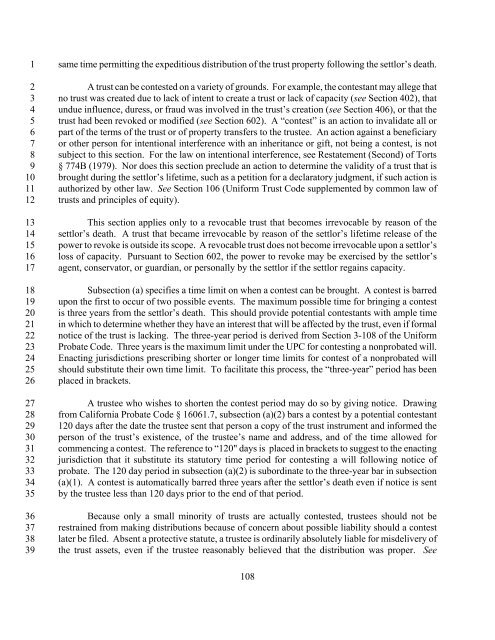uniform trust code - Kansas Judicial Branch
uniform trust code - Kansas Judicial Branch
uniform trust code - Kansas Judicial Branch
Create successful ePaper yourself
Turn your PDF publications into a flip-book with our unique Google optimized e-Paper software.
1<br />
2<br />
3<br />
4<br />
5<br />
6<br />
7<br />
8<br />
9<br />
10<br />
11<br />
12<br />
13<br />
14<br />
15<br />
16<br />
17<br />
18<br />
19<br />
20<br />
21<br />
22<br />
23<br />
24<br />
25<br />
26<br />
27<br />
28<br />
29<br />
30<br />
31<br />
32<br />
33<br />
34<br />
35<br />
36<br />
37<br />
38<br />
39<br />
same time permitting the expeditious distribution of the <strong>trust</strong> property following the settlor’s death.<br />
A <strong>trust</strong> can be contested on a variety of grounds. For example, the contestant may allege that<br />
no <strong>trust</strong> was created due to lack of intent to create a <strong>trust</strong> or lack of capacity (see Section 402), that<br />
undue influence, duress, or fraud was involved in the <strong>trust</strong>’s creation (see Section 406), or that the<br />
<strong>trust</strong> had been revoked or modified (see Section 602). A “contest” is an action to invalidate all or<br />
part of the terms of the <strong>trust</strong> or of property transfers to the <strong>trust</strong>ee. An action against a beneficiary<br />
or other person for intentional interference with an inheritance or gift, not being a contest, is not<br />
subject to this section. For the law on intentional interference, see Restatement (Second) of Torts<br />
§ 774B (1979). Nor does this section preclude an action to determine the validity of a <strong>trust</strong> that is<br />
brought during the settlor’s lifetime, such as a petition for a declaratory judgment, if such action is<br />
authorized by other law. See Section 106 (Uniform Trust Code supplemented by common law of<br />
<strong>trust</strong>s and principles of equity).<br />
This section applies only to a revocable <strong>trust</strong> that becomes irrevocable by reason of the<br />
settlor’s death. A <strong>trust</strong> that became irrevocable by reason of the settlor’s lifetime release of the<br />
power to revoke is outside its scope. A revocable <strong>trust</strong> does not become irrevocable upon a settlor’s<br />
loss of capacity. Pursuant to Section 602, the power to revoke may be exercised by the settlor’s<br />
agent, conservator, or guardian, or personally by the settlor if the settlor regains capacity.<br />
Subsection (a) specifies a time limit on when a contest can be brought. A contest is barred<br />
upon the first to occur of two possible events. The maximum possible time for bringing a contest<br />
is three years from the settlor’s death. This should provide potential contestants with ample time<br />
in which to determine whether they have an interest that will be affected by the <strong>trust</strong>, even if formal<br />
notice of the <strong>trust</strong> is lacking. The three-year period is derived from Section 3-108 of the Uniform<br />
Probate Code. Three years is the maximum limit under the UPC for contesting a nonprobated will.<br />
Enacting jurisdictions prescribing shorter or longer time limits for contest of a nonprobated will<br />
should substitute their own time limit. To facilitate this process, the “three-year” period has been<br />
placed in brackets.<br />
A <strong>trust</strong>ee who wishes to shorten the contest period may do so by giving notice. Drawing<br />
from California Probate Code § 16061.7, subsection (a)(2) bars a contest by a potential contestant<br />
120 days after the date the <strong>trust</strong>ee sent that person a copy of the <strong>trust</strong> instrument and informed the<br />
person of the <strong>trust</strong>’s existence, of the <strong>trust</strong>ee’s name and address, and of the time allowed for<br />
commencing a contest. The reference to “120" days is placed in brackets to suggest to the enacting<br />
jurisdiction that it substitute its statutory time period for contesting a will following notice of<br />
probate. The 120 day period in subsection (a)(2) is subordinate to the three-year bar in subsection<br />
(a)(1). A contest is automatically barred three years after the settlor’s death even if notice is sent<br />
by the <strong>trust</strong>ee less than 120 days prior to the end of that period.<br />
Because only a small minority of <strong>trust</strong>s are actually contested, <strong>trust</strong>ees should not be<br />
restrained from making distributions because of concern about possible liability should a contest<br />
later be filed. Absent a protective statute, a <strong>trust</strong>ee is ordinarily absolutely liable for misdelivery of<br />
the <strong>trust</strong> assets, even if the <strong>trust</strong>ee reasonably believed that the distribution was proper. See<br />
108

















